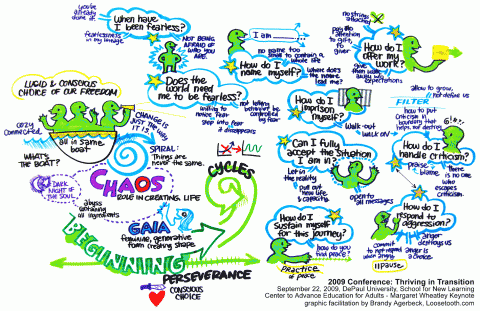This past fall (2009) DePaul’s Center to Advance Education for Adults invited Margaret Wheatley to give the opening keynote and lead an afternoon workshop at a conference we titled “Thriving in Transition.” I hadn’t realized the experience would include a chance to co-create a transformative playspace.

Map of Margaret Wheatley’s Thriving in Transition Keynote, by Brandy Agerbeck
During the afternoon workshop we were invited to form small groups where we first told one version of our story, and then (after reconvening with new people) told a completely different version of our story. My favorite story was when, in response to the question “how do you respond to aggression?,” a very conservative-looking woman from the Chicago Archdiocese explained that she immediately began rapping when faced with aggression. In great detail she told us how she defused even the most violent aggressors by incorporating their criticisms and threats into her rap songs, and even occasionally broke into the latest street dance moves.
We delighted ourselves and each other with this lived experience of telling playful imaginative variations of our stories. Tales of fear and insecurity transformed into courageous acts; experiences of anger and frustration became filled with compassion and hope; and stories of victimization became doorways to empowered new beginnings.
Ever since that experience and the energy created in it, I have slowed down a bit and—if not in the actual moment of my story-telling, soon after—imagined other versions of the story. Perhaps the person cutting me off in traffic was not consumed in their own self-centeredness, but rushing to the aid of a sick child; perhaps the angry outburst at the board meeting was not an attack, as much as an expression of fear of the uncertain future. Each imaginative variation of the story gives us the power to reposition ourselves, make different choices and have different responses.
This practice seems particularly resonant with playspace which invites us to play new roles and create more play in the system.
